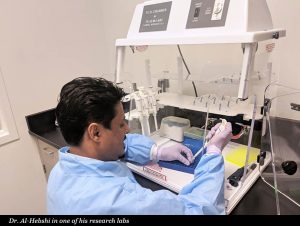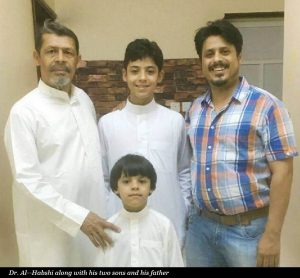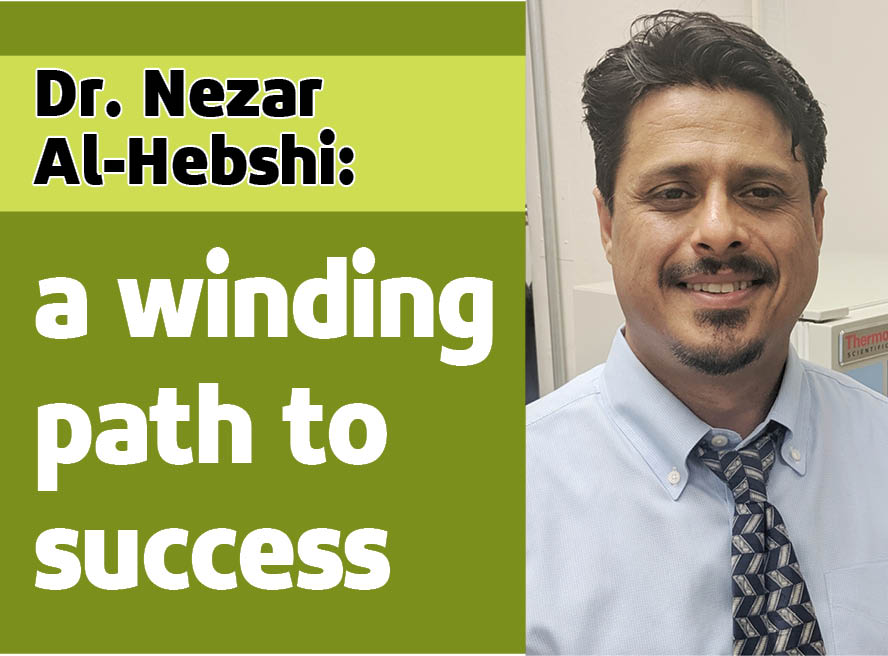Special Report
By Kipp Cozad – YAN

 There is a saying in English that water will always find its level. For Dr. Nezar Al-Hebshi, it took a while for that water to settle. Dr. Al-Hebshi’s path is winding and in many ways very Yemeni.
There is a saying in English that water will always find its level. For Dr. Nezar Al-Hebshi, it took a while for that water to settle. Dr. Al-Hebshi’s path is winding and in many ways very Yemeni.
Dr. Al-Hebshi has begun to find his place in the suburbs of Philadelphia where he works as an Associate Professor and Director of a lab at Temple University in microbiome research, a relatively new field that focuses on genetic material as it applies to bacteria and fungus in the body. Specifically, Dr. Al-Hebshi’s research centers on the microbiomes of oral cancer. Recently, Dr. Al-Hebshi received two highly competitive grants from the National Institute of Health to carry out his research, a rare achievement even for the most seasoned of applicants.
Though his research is in itself impressive, the journey that Dr. Al-Hebshi took was remarkable. Born from a union of two Adenis, who lived under British colonial rule, his parents later moved to Sana’a where his father, Noor Al-Hebshi, worked for British Cable and Wireless, later becoming Teleyemen. Born and raised in Sana’a, education was a strong emphasis in the Nezar household and that led Nezar to obtain a dental surgery degree from Sanaa’s University of Science of Technology. Nezar was among the first cohort of dentists to graduate there. Nezar planned to continue his education, but corruption in Yemen served as a roadblock to advancement. His academic talent drew the attention of Ali Idris, a Sudanese professor, who had good connections with Scandinavian universities. Having Nezar as a student, Dr. Idris was surprised that Nezar was unable to advance academically in Yemen. Dr. Idris suggested that Nezar try the University of Bergen in Norway. “He pulled out the last application from his bag and said, ‘Let’s complete this and send it in,’” Dr. Al-Hebshi recounted. Nezar became the first Yemeni to receive a full scholarship at Bergen University [largely in part because there were no diplomatic relations between the two countries.
Dr. Al-Hebshi returned to the University of Science and Technology in Sana’a where he taught microbiology to dental, pharmacy and medical students for six years before taking a job in Saudi Arabia where research became the focus of his professional work. Dr. Al-Hebshi aimed to be in a more competitive and rich research environment. Dr. Al-Hebshi applied for a position at Temple University and received the job.
Dr. Al-Hebshi’s mobility has provided tremendous insight on the world. Like so many Yemenis, travel provides a level of cosmopolitism that is not prevalent in most countries. “Living in Norway was a very bad experience in terms of social life,” Dr. Al-Hebshi shared. The people, though kind, were very cold and “too quiet. It was not the right place for a Yemeni that comes from a very noisy place.” When Dr. Al-Hebshi visited the US prior to living here, he loved it instantly. He enjoyed the diversity and the liveliness of the culture.
Dr. Al-Hebshi, in his quest to find a safe environment for his family and great schools for his four children, finds himself removed from the Yemeni-American diaspora in the northeast suburbs of Philadelphia. With visa issues at play, his wife struggles because she cannot work, and three of his children are in schools where they must navigate the cultural differences.
Dr. Al-Hebshi has not forgotten his birth country. With many Yemeni contacts throughout the world, he considers himself an activist on the situation now afflicting Yemen. Like so many Yemenis, Dr. Al-Hebshi believed the Saudi-led intervention would help Yemen, now that it’s been four years since the foreign campaign began, he understands that his original position was wrong. Outsiders have made the situation even worse.
Dr. Al-Hebshi is an advocate for Yemenis becoming more involved in American society and wants to see Yemeni-Americans striving for more economic mobility. Not surprising, Dr. Al-Hebshi believes that education is the key. Many of those Yemenis with Ph.Ds. began their education in Yemen. He does not see many American born Yemeni-Americans striving for such lofty goals. “We would like to see more Yemeni-American professionals, more involved in politics, working everywhere in the US government to contribute to the country.”
Dr. Nezar Al-Hebshi’s family’s links to a bygone era in Aden and the Yemen of the post-Revolutionary period is a narrative connected to the past, but his story is very much one grounded in twenty-first century Yemen. Conflict and economic instability put Dr. Al-Hebshi on a trajectory of mobility. Despite all the hardship and effort, Dr. Al-Hebshi is now in a place where he feels appreciated, and the United States is much better for it. As a proud son of Yemen, he will always have one foot in the relative comfort of America and the other pushing for peace and stability back home.












